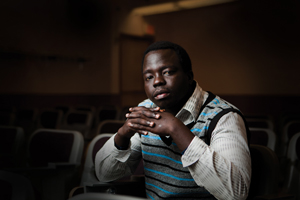
Finding Freedom Through Education
You’re 12 years old. You live in a mud hut with a tin roof in a desert. You eat one bowl of grain a day and you live among 70,000 refugees in a place known as “nowhere.”
These are recent memories for Maurice Aduto. It’s also what drives him to seek opportunities and make a difference in his homeland of South Sudan, a country that gained independence in 2011 after a 22-year civil war.
When Aduto was a young child herding cattle with his uncles, brothers and cousins the problems of Sudan’s war seemed far away. His family lived in Chukudum, a village near the Uganda border in east Africa.
The village was known for its fertile land and abundant harvests. Aduto has fond memories of the tranquil valley where he played. He also remembers his British-trained elementary school teachers, who taught him the importance of education.
Things changed in his village as the war moved south. The violence threatened Aduto’s family. The soldiers were killing children.
Many families decided to send their children to Kenya for safety. Aduto was sent and he remembers running for an entire week, evading soldiers and wild animals before reaching the border.
“It was a long journey. We only traveled at night, “Aduto says. “People were dying from lack of water and food.”
When the refugees reached the Kenyan border the United Nations took them to the Kakuma refugee camp. The camp’s name means “nowhere” in Swahilli. Aduto spent the next six years in a dusty maze of refugees from eight nations. To survive he focused on a lesson he carried in his soul.
“In middle school the teacher told us that school is everything,” Aduto says. “The pen is everything. It is the key to your life.”
Aduto and his family spent two years navigating through red tape to get to the United States. When he arrived in Des Moines he was 20 years old and considered too old to attend high school. Aduto persuaded officials to allow him to finish his last year. He supported himself with a part-time maintenance job, survived on $90 a week and graduated in 2007.
One of Aduto’s goals was to attend college. He was inspired by the numerous opportunities he could see in the United States.
“I talked to my high school counselor who helped me find scholarships that fit my status and public universities that I could join,” Aduto says.
Iowa State University’s Multicultural Vision Program offered him a scholarship and a chance. The award is given to high school seniors who demonstrate academic ability and maturity, despite adverse situations. Aduto fit the description.
His first semester at Iowa State was difficult. Aduto knew his grandparents, who had raised him, had died in the war. It suddenly overwhelmed him.
“I felt so bad and I wondered what the point was to be here. I couldn’t focus,” Aduto says. “Then I realized many of the wishes my grandparents gave me had come true.”
He continued and decided to major in animal ecology and minor in forestry. Skills he could take to South Sudan, which is rich in wildlife and natural resources.
Aduto also found a trusted friend and adviser in John Burnett, a student services specialist in the natural resource ecology and management department. Burnett and coworkers helped Aduto return to his village in 2009 to attend reburial ceremonies for his grandparents.
“Maurice’s life is about his connections with his family and his home country,” Burnett says. “He has overcome unimaginable adversity, but he still maintains those connections.”
With the help of Burnett, Aduto became a U.S. citizen on Oct. 14, 2011, just 47 days before returning to South Sudan. This time Aduto returned to oversee a reburial ceremony for his father, who had been killed by robbers in the spring of 2011.
On July 9, 2011, the Republic of South Sudan celebrated its independence from Sudan. As president of the South Sudanese Student Association at Iowa State, Aduto helped exiled residents register to vote and cast their votes in the election, which was held Jan. 9, 2011. More than 98 percent of South Sudan’s residents voted to separate.
Aduto, who is a senior at Iowa State, plans to return to South Sudan. He says his generation represents the seeds that have been scattered throughout the world.
“We are the seeds that are vital to the development of South Sudan,” Aduto says. “Most of us who came here are the children of war. To go back is tough, but to take the initiative and make the sacrifices to go back is important for the future of South Sudan.”



